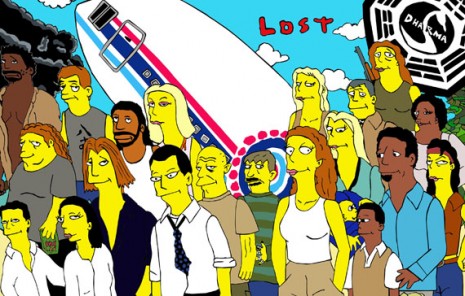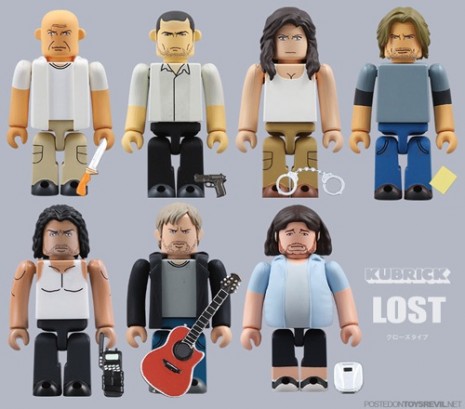The series finale of Lost aired last night. We watched it. Have you seen it yet? If not, then pay attention for the following…
SPOILER ALERT! Run away! Run away! (what? it’s only a rabbit!) RUN AWAY
So, Jonathan Locke turns to Benjamin Linus outside of a church and says, “If it means anything to you, I forgive you.”
Benjamin Linus (the sniveling little rat throughout how many seasons…) receives the statement with disbelief and, if his expressions could speak, he was healed by hearing it.
I believe that each of us needs to hear those words: I forgive you.
Because of the fall, because of the way we were wired, our soul longs for restoration and forgiveness. I believe this and I’ve implemented it into my life. When someone says, “I’m sorry!” I do my best to find a tactful, un-obtrusive way to say, “I forgive you.” Saying, “That’s alright” or “it’s cool” or “it’s no big deal” come more naturally, but perhaps leave the offender’s soul unsatisfied. It’s a very subtle thing I’m talking about and it might be silly and unnecessary for minor offenses, like accidentally using your roommate’s cereal or bumping into someone coming out of an elevator. But if it’s not too weird, it’ll help train our response/reaction in the future to be quick to forgive. And that’s a good thing.
What I loved about the Lost final episode was the importance and emphasis placed on relationships. I just finished listening to the audio book by Erwin McManus, Wide Awake, which made a point to emphasize the same thing. The author basically says that we will be most fulfilled when we are busy serving others and helping others find and live out their dreams. This seems to line up with the character and moral lessons God has taught us in the Scriptures. Love your neighbor as yourself is so key to living beyond the ups and downs of life. When we’re miserable (and people want or should run away from us) and depressed, one of the best pieces of advice I’ve heard is “focus on others.” When your problem compares itself to another person’s problem (especially if it’s “worse” than yours), it helps us get perspective. It helps us be thankful. Giving thanks, even during tough times, can be such a heart-saving action. I’ve certainly found that to be true.
On the subject of treating others better than yourself and valuing relationships, I think of a great man I know. This guy is so awesome. I count it as a privilege to be his friend. I don’t know exactly how he does it, though by hanging out with him I’ve got a few clues, but he can walk in a room you’re in and make you feel important. His name is Jayson. He was the pastor at Mission Hills Church from its founding/planting until just before its merging with another church (which is kind of a beautiful thing to see, when you think about it … cuz two churches disbanding is double sad, but a merger is redemptive and underscores that the body of Christ is bigger than one single congregation). The principles this guy holds dear (besides a healthy routine that includes prayer – both “corporate” and “private” – and a few other disciplines, like reading the Bible and regular fellowship with the family of God) are so core to what I believe. The church is a family. We are a body. We need each other. This body is universal. It’s city-wide. It’s state-wide. It’s nationwide. It’s all around the world.
This dude used to seek the Lord every year around New Year’s Eve with a special emphasis on, “Is this where You want me, Lord.” And sometime around the late ’90s he felt like God was telling him, “Nope. Your time as pastor of Mission Hills Church is coming to an end.” Now he’s doing something that his visionary heart seems to thrive in. He’s coordinating with a para-church organization that networks between churches and missions. I left off his last name here as a precaution so that he doesn’t get in trouble with a nation that might be hostile to the spread of the Gospel. In case you were not aware, there are countries that resist the spread of the Gospel in our day and age. Believers are persecuted, put in jail, mobs burn their churches, homes, etc. There are modern day martyrs all over the world now. Seems like I heard that we’ve had more martyrs for the faith in this century than all the previous since the birth of the church. Not sure if that’s accurate, but…
There are a few other people like this that I truly admire. It’s great to be around people like Thomas Cogdell or Kyle Key, because you find yourself wanting to be more like them. And that’s one way you can be more like someone – hanging with them. Kyle was a campus pastor with Chi Alpha Christian Fellowship on the campus of the University of Texas. I remember him putting flesh to the principle of “pouring your life out for others.” And it wasn’t a weird, cult-ish thing or some extraordinary acts of service. It was simply making time for people, hanging with them. Keeping up with their life. Supporting them. Listening to them. Encouraging them. Praying with and for them. That kind of stuff changes the world.
So, there was another scene in Lost where one character was telling another what it is they could do now or what their purpose was and the character said it was to go home and be with your spouse and child. That act of “being with” is so profound. That is real life. That is what’s important.
I recall the beginning of Rick Warren’s book, The Purpose-Driven Life, which (if I recall correctly) starts off by saying, “Begin with the end in mind…imagine being at your funeral. What would you want people to say?” Would you want people to say, “He was a great football player. Man, he really knew how to crunch numbers. Wow, he built a great bridge over Highway 41…?” Or would you rather have people say, “I’m going to miss this person. They loved me so much. They really gave me their time…?” It’s the latter that is implied as being the better choice, of course, and we are implored or motivated to then start acting in a way that would build a foundation and give people reason to say or think those things if and when they later attended our funeral.
That’s powerful stuff. These are the kinds of things that Lost as a series dabbled with. It was so rich in symbolism. I’m probably not the first to point out that Jack having Hugo drink this particular water “made you like me” had some correlation to Communion/the Last Supper and sharing the Cup of Redemption at Passover. Subtle, but interesting. I like how the writers left much up to the imagination. They didn’t beat us up and mold every detail into a theologically-sound framework. I really think that the television series was heavily based upon a Christian worldview, but the ending not specifically bringing up the Name of Christ or spelling out if, how and when “entering the light” and “moving on” after death can leave it up to speculation (and therefore not be a Sunday School lesson for dummies), but who needs that when we have brains? Why can’t a great piece of art be appreciated by people with opposing viewpoints or lead people to different conclusions? Was Star Wars bad because it was dripping with Eastern philosophy?
Now, the biggest question I’m left with after watching the conclusion to the Lost series is: when did they die? And…is Sawyer going to start a Southern Rock band with Charlie? He’d look pretty cool playing a bottle neck slide…
🙂


Comments